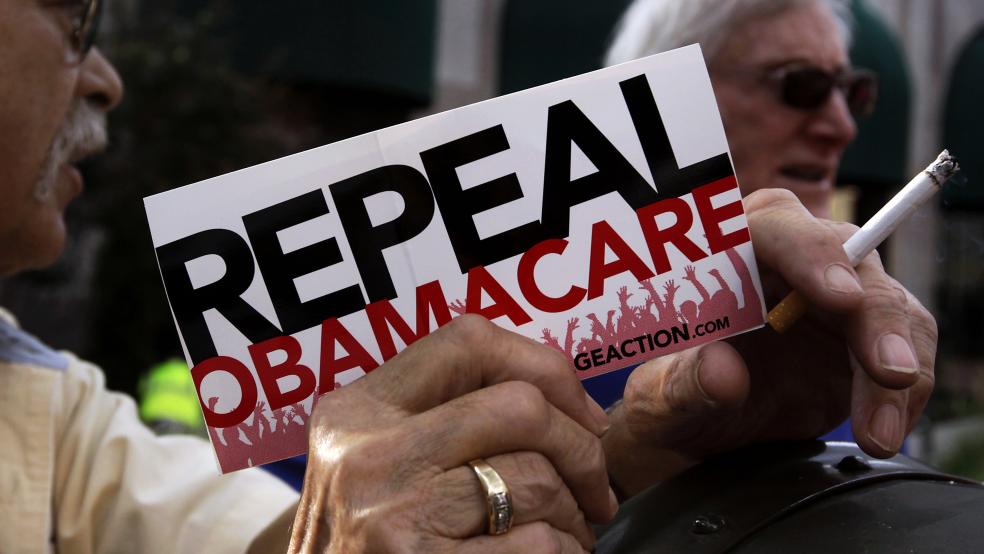Every four years, politicians and pundits like to play a well-known game: Find the Mandate. After the ballots get counted, the debate shifts to whether a new or returning president has received a “mandate” for his agenda, or whether the circumstances of an election suggest a humbler approach of compromise with the opposition.
This election makes that game more difficult to play than ever, as very little of its dynamics had much to do with policy questions. Both candidates offered ambiguities on their plans and spent almost all of the rest of their time excoriating their opponents’ personal and professional shortcomings.
Related: Obamacare: The Biggest Casualty of Trump’s Stunning Victory Over Clinton
However, one mandate does manage to emerge through the fog of political battle. Americans dislike the Affordable Care Act, have become outraged over its skyrocketing costs, and want it repealed.
That message doesn’t just come through the presidential race, but it has been one of the most consistent policy messages from Donald Trump over the course of the campaign. After a couple of initial stumbles on the nuance of government-run marketplaces in the primaries, Trump offered a simple message on Obamacare – repeal and replace it.
That became almost the only policy issue Trump discussed down the stretch as news of massive premium hikes began emerging as the general election kicked off. By the last week of the campaign – when consumers saw the havoc wreaked on their insurance after open enrollment began – Trump kept hammering Obamacare as the central policy argument for rejecting the political establishment in Washington DC.
Don’t just take Trump’s word for it, though. Democrats were poised to take back control of the Senate, having a historic opportunity with Republicans defending 14 more seats. Combined with the normal turnout dynamics of presidential election cycles, predictions about the post-election landscape focused on how Democrats could leverage their Senate majority with a Hillary Clinton presidency.
Related: Obamacare Is Being Repealed by Consumers, Providers and Insurers
Instead, Democrats lost almost every pickup opportunity they had – even in two states where they brought back popular former Senators to run for their old seats. In states where the premium hikes have hammered voters hardest, Republican Senate candidates outperformed Trump – states like Florida, Pennsylvania, Wisconsin, and Ohio, among others.
Two months ago, I predicted that the GOP might stun Democrats over Obamacare, and prices were only one reason. “Voters in almost all key battleground states have at least one insurer pulling out of the exchanges,” I noted. Polls showed that losers far outstripped winners (43 percent to 8 percent) in the Affordable Care Act.
Republican strategist Ron Bonjean also predicted a backlash in the Senate races as far back as August. “It feels like there’s a sleeping giant that’s about to awaken on the campaign trail,” he told The Hill’s Sarah Ferris. “It really does seem like an easy target, an easy layup for Republicans to score points.” The Republican triumph in holding Senate control against long odds shows that the sleeping giant did awaken and establishes a mandate for action.
Related: Ryan Declares GOP Has a ‘Mandate’ to Enact Sweeping Changes
Besides, Republican voters have already revolted over a lack of progress in dismantling Obamacare. Trump’s ascendancy in the primaries came as a direct result of overpromising on that task in the 2014 midterms. If Republicans dally any farther with single-party governance, then the 2018 election cycle will make this look like, well … a tea party of a more genteel type. Even James Carville acknowledged the politically obvious, noting on MSNBC that “Obamacare is dead.”
What would repeal and replace look like? President Obama scoffed at the promise just a few days ago, claiming that neither Trump nor Republicans have an alternative to the collapsing structure Obama and Democrats shoved through Congress more than six years ago. Until recently, that accusation had a core of truth to it; despite unanimous opposition to Obamacare (no Republican ever cast a vote for it), the GOP had not produced a comprehensive approach to replace it.
This summer, Republicans finally came together on a free-market approach to dismantling Obamacare and restructuring the market to solve long-standing concerns. Titled “A Better Way,” the proposal would end government control of health insurance markets and the individual mandate for comprehensive policies that many Americans neither need nor can afford.
Related: 5 Reasons Why Trump Won the Election
It would also eliminate the employer mandate that has discouraged full-time employment, and end the need to bail out insurers from losses that the individual mandate and “community rating” requirements have produced. It devolves oversight of insurers back to the states and expands choice by allowing interstate sales of health insurance policies.
Will this proposal find a consensus in Congress? Perhaps not enough for Republicans to attempt a forced vote in a similar manner as to how Obamacare passed in March 2010, but it certainly will form the basis for negotiations – after repealing the existing system. Voters gave Trump and Republicans perhaps only this one clear mandate – and they had better get it accomplished before taking on anything else.






